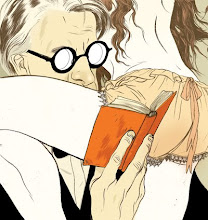In A Portrait of the Artist as a Young Man, good Ol’ James Joyce spends quite a bit of time writing about how he wants to flee Ireland for good. Towards the end of the book, through his proxy Stephen Dedalus, he says, “When the soul of a man is born in this country there are nets flung at it to hold it back from flight. You talk to me of nationality, language, religion. I shall try to fly by those nets” (171). In other words, if you want to be a great writer/artist, you need to shake off the constraints placed upon you by your birthplace. Joyce’s character believes that one can only understand and write about Ireland by leaving it. He writes that he wants to “forge in the smithy of my soul the uncreated conscience of my race” (213), and this can only be achieve through self-imposed exile.
As I was working through the last of the Part about the Critics, I found myself vigorously underlining and starring the exchange between Amalfitano and the critics about exile and fate, and thinking about the above Joyce passages. On page 117, Bolano writes:
“Amalfitano looked at them and then at his margarita and said, as if he had repeated it many times, that in 1974 he was in Argentina because of the coup in Chile, which had obliged him to choose the path of exile. And then he apologized for expressing himself so grandiloquently. Everything becomes a habit, he said, but none of the critics paid much attention to this last remark.
‘Exile must be a terrible thing,’ said Norton sympathetically.
‘Actually,’ said Amalfitano, ‘now I see it as a natural movement, something that, in its way, helps to abolish fate, or what is generally thought as fate.’
‘But exile,’ said Pelletier, ‘is full of inconveniences, of skips and breaks that essentially keep recurring and interfere with anything you try to do that’s important.’
‘That’s just what I mean by abolishing fate,’ said Amalfitano, ‘But again, I beg your pardon.’”
This exchange, like much of 2666, it much more complicated than it initially appears. What complicates this bit is that mention of habit. What becomes a habit? Life after exile? Telling the story about leaving Argentina over and over? Expressing himself grandiloquently? Or does Amalfitano simply mean that everything that once seems new becomes common with familiarity? I feel like you could make an argument for any of these ideas, but once the rest of the discussion is taken into consideration, it seems that this idea of habit and fate are intertwined.
Amalfitano explains that exile breaks up your life, changes your plans, and forces you to look at things from different perspectives. Pelletier sees this as a terrible thing. It shakes things up, takes you out of the comfort zone, and from doing “important things” (note that at the end of their trip, as Espinoza is trying to sleep with Rebecca [and civilize her {Seriously, what a pig}], Pelletier spends all his time reading books he has already read, over and over, steadfastly refusing to deviate from his plan, though he is shaken by Norton’s choice of Moroni). Amalfitano doesn’t seem to think so. This difference of opinion is important to the book. Archimboldi has, it appears, exiled himself. But it is unclear whether he is like Joyce, trying to gain a new perspective on his work or whether he simply wants to travel (if he left Europe at all). Amalfitano could see this leaving as a natural choice. The critics seek to restore him to Europe. The critics’ views are, in this way, provincial (which is a fantastic irony, because they hold themselves as better, more cultured, than anyone they meet in Mexico).
Still, the book promises a later “Part about Fate.” I’m sure some of these ideas, especially about fate being seemingly synonymous with routine, will be revisited. At this point, I’m glad to see the critics go. They seemed like small, petty people. I’m ready for some folks who are more in touch with reality.
Next week: A post about Thomas Pynchon. Then: THE PART ABOUT AMALFITANO!

